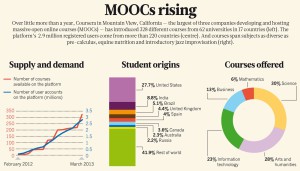
Disruptive technology is a machination, stratagem or invention that displaces an established industry methodology and redefines its internal infrastructure, often to the point of deconstruction. Currently, the industry model that has become the target of disruptive technology is that of on-campus education.
University Extension at Harvard has most likely expanded beyond what President A. Lawrence Lowell thought it would be when he established the program 100 years ago. The extension program now offers world-renowned education to 50 states and 195 countries due to the growing popularity of MOOCs — massive open online courses. Harvard University, along with many Ivy League institutions, has been considering offering Harvard courses and degrees online lest they fall behind the disruptive technology utilized by distance learning.

The controversy with online learning as actual course syllabus has been two fold. When Harvard Business School dean, Nitin Nohria, commenced the campus planning and case study method adoption, he came across opposition — by staff and students.
The pros and cons of the ‘to online or not to online’ argument has been personified by two of Harvard’s most renowned faculty members. For Michael Porter, “A company must stay the course, even in times of upheaval, while constantly improving and extending its distinctive positioning.”
Speaking on behalf of the pro argument is Clayton Christensen (author of the 1997 book,The Innovator’s Dilemma), who suggests that the only way market leaders like Harvard Business School survive “disruptive innovation” is by disrupting their existing businesses themselves.
Other reputable schools, like Stanford and Wharton School (UPenn), have gone Christensen’s way of thinking by adopting MOOCs into their curricula, without the pillar and post debate as seen by HBS. One of the biggest draws of MOOCs for students is the considerably lowered tuition costs — HBS runs approximately $100K for an MBA.
Though a student should not expect to garner a traditional Harvard M.B.A. online, as of this summer, HBS launched the HBX Program, which has its own admissions office and has aims to create a new entity of degree. The “pre-MBA”, according to Harvard Business School professor Jay W. Lorsch, would offer a new type of credential. “Instead of having two big product lines, we may be on the verge of inventing a third.”

Some educators predict a dire future for colleges that allow this online ‘watered down’ curriculum. Jeffrey Pfeffer, a professor of organizational behavior at the Stanford Graduate School of Business, pointing to the aircraft industry stated, “In order to get into China, Boeing transferred its technology to parts manufacturers there. Pretty soon there’s going to be Chinese firms building airplanes. Boeing created their own competition.” Pfeffer thinks business schools are on a similar path, “[we] are doing it again; we are creating our own demise.”
That sentiment may be falling on deaf ears, as HBX has tentatively begun admitting several undergraduate students into a program called Credential of Readiness (CORe). Thus far, the program includes three online courses: accounting, analytics and economics for managers. The course is nine weeks and tuition is $1,500. Only students with a high level of class participation will be invited to take a three-hour final exam at a designated testing center.
Despite Harvard Business School debate or which side of the argument any given person resides, educational disruption isn’t coming, it has arrived.
Research credit: A. Anderson